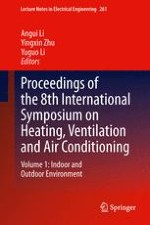2014 | OriginalPaper | Chapter
7. Air Distribution and Ventilation Effectiveness in a Room with Floor/Ceiling Heating and Mixing/Displacement Ventilation
Authors : Xiaozhou Wu, Lei Fang, Bjarne W. Olesen, Jianing Zhao
Published in: Proceedings of the 8th International Symposium on Heating, Ventilation and Air Conditioning
Publisher: Springer Berlin Heidelberg
Activate our intelligent search to find suitable subject content or patents.
Select sections of text to find matching patents with Artificial Intelligence. powered by
Select sections of text to find additional relevant content using AI-assisted search. powered by
